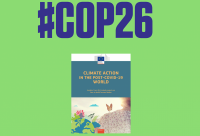Climate Action in the Post-COVID-19 World

The COVID-19 crisis has had dramatic economic consequences in Europe. Despite significant public interventions, more than 1.8 million jobs were lost in the EU up to September 2020. As fiscal stimulus measures continue to be announced, policymakers have an opportunity to ensure that the short-term stimulus points the economic recovery in a sustainable direction in the long term, considering the trade-off between these goals.
The PARIS REINFORCE HORIZON 2020 European project coordinated by the Decision Support Systems Lab of ECE-NTUA – Prof. Haris Doukas is the Scientific Responsible – investigated this trade-off between short-term economic gains, in the form of employment, and longer-term CO2 emissions reductions from fiscal stimulus packages. Moreover, analysis was performed to identify the optimal energy investment mix of proposed fiscal programmes in terms of new energy sector jobs and CO2 emissions cuts compared with a current policy baseline.
The analysis focused primarily on the EU-27 plus the United Kingdom but also analysed five other major emitting regions: Canada, China, India, Japan and the United States. Seven technologies were considered: advanced biofuels, biomass, solar photovoltaics (PV), concentrated solar power, onshore and offshore wind, and nuclear. The analysis compared portfolios with different investment weights for each of these technologies. For Europe, we found that green recovery funds can help the EU create up to 1.4 and 0.4 million new job-years by 2025 and 2030, respectively, and further cut emissions by 300–800 MtCO2. A clear trade-off was found between subsidy portfolios performing well in terms of employment and those performing well in terms of emissions reductions. Onshore and offshore wind investments can significantly boost energy sector employment, while investments into biofuels may perform relatively better for further emissions mitigation (caution is, however, needed regarding their sustainability and availability, especially regarding advanced biofuels). Investment portfolios favouring already cost-competitive technologies (e.g., onshore wind and solar PV) may boost energy-sector employment the most by 2025 but quickly lose momentum, leading to negligible jobs gains over the entire decade. This is because certain investments only pull forward employment opportunities that would have been created anyway before the end of the decade under the current policy framework. On the other hand, prioritising currently less cost-competitive technologies (e.g., offshore wind and CSP) may alter the trajectory expected under current policies, allowing for diversification of technological capacity with an ongoing positive effect in the future and the creation of longer-lasting job opportunities.
Despite heterogeneous implications for each region, key takeaways from our analysis were that there is ‘no one size fits all’ and that countries, companies and communities can learn faster, with and from one another. Moreover, both the EU and other major emitting countries (such as Canada, China, India, USA, Japan, etc.) would strongly benefit from greener agendas, on their way to recovering from the COVID-19 pandemic.
This analysis is included in the COP26 European Commission's Policy Publication, "Climate Action in the Post-COVID-19 World".
